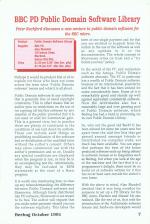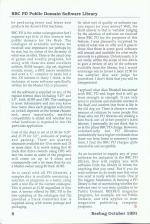
Beebug
 1st October 1991
1st October 1991
Author: Peter Rochford
Published in Beebug Volume 10 Number 5
Peter Rochford discusses a new venture in public domain software for the BBC micro.
BBC PD Public Domain Software Library
Perhaps it would be prudent first of all to explain for those who have not come across the term what 'Public Domain software' means and what it is all about.
Public Domain software is any software that is generally free of usual copyright constraints. This in effect means that an author puts no restrictions on the use of (or copying of) his/her software by any member of the public provided that it is not used or sold for commercial gain.
This is a general view, but in practice there are plenty of variations in the conditions of use laid down by authors.
These can include such things as prohibiting modification of the software and re-distribution of the modified form without the author's consent. Others may allow commercial use with the author's permission and so on. Usually any special conditions are displayed when the program is run, or may be in an accompanying text file. Alternatively, they may be included in REM statements at the start of a Basic program.
It is worth also mentioning here, to clear up any misunderstanding, the difference between Public Domain software and Shareware. Although freely distributed like PD software, Shareware is not meant to be free. The author will request that you make some payment should you use the software regularly. This takes the form of one single payment and for that you are entitled to support from the author in the use of the software as well as any updates to it or the documentation. The whole concept of Shareware relies on trust and a "try before you buy" policy.
In the world of the PC and computers such as the Amiga, Public Domain software abounds. The PC in particular has a wealth of Public Domain software, because of its international popularity and the fact that it has been around for some considerable time. Some of it is remarkably good and stands up well against equivalent commercial software.
Now the Archimedes also has a reasonably large and ever-growing pool of Public Domain software, which Beebug has had a hand in promoting via its own Public Domain Library.
So, why not the good old Beeb? It has been around for some ten years now but apart from the odd few bits that get passed around amongst friends or distributed via computer clubs, not much has been available. You can argue that perhaps the best of the home-produced software ends up being offered to software houses or to magazines such as Beebug, but when you look at the age of the machine and the fact that it is a programmer's delight, there must be an awful lot of software written for it that has never been seen outside the author's own home.
With the above in mind, Alan Blundell decided that it was long overdue for someone to set up a PD library for the BBC micro, Electron and Master. He also realised, like the rest of us, that with the introduction of the Archimedes software houses and hardware developers would be producing fewer and fewer new products for Acorn's 8 bit machines.
BBC PD is the rather unimaginative, but I suppose apt, title of this venture into public domain for the Beeb. The catalogue of available software we received was impressive not perhaps by its size, but by virtue of the diversity of what was on offer. There is the usual crop of games and novelty programs, but along with these are some excellent utilities, ROM images, clip art, digitised sounds, music, a 6502 macro assembler and even a 'C' compiler to name but a few. Of interest to many I think, is the inclusion of some software specifically written for the Master 512 co-processor.
All the software is supplied on any of the regular format discs including 5.25" and 3.5", both ADFS and DFS. The catalogue is most informative and lets you know how many discs each program will come on (which depends on the format chosen) and, most importantly, machine compatibility is stated and whether any other hardware is required to run the particular application.
Cost of the discs is set at £1.50 for 5.25 and £1.75 for 3.5", inclusive of postage and packing. There are quantity discounts available for 10 or more and 25 or more discs. It is worth noting that 40 track disc drive owners using DFS will fare the worst as some of the programs will come on up to 4 discs and consequently cost a lot more than for say a Master owner using 80 track ADFS.
As is usual with all PD libraries, a sampler disc is available containing a selection of programs as a taster, along with a text file of the current catalogue. This is priced at £1.50 regardless of disc size. A service offered by BBC PD is the free updating of the catalogue text file provided a blank formatted disc is supplied along with return postage and packaging.
So what sort of quality of software can you expect for your money? Well, the short answer to that is 'variable' judging by the selection of software we received from BBC PD for the purposes of this feature. I was pleasantly surprised by some of what was on offer and it goes to show that there is some good software still around and available for what really amounts to a pittance. Unfortunately, it is not really within the scope of this article to give a review of any of the software available from the library, but I would encourage you to invest a mere £1.50 for the sampler disc and judge for yourselves. I don't think that you will be disappointed.
I applaud what Alan Blundell has started with BBC PD and hope that it will go from strength to strength. It can only serve to promote and maintain interest in the Beeb and confirm that there is life in the old dog yet. There is always a certain amount of criticism by some people that those who run PD libraries are making a fast buck out of other people's hard labours. I personally do not think that is so at the prices BBC PD charge. However, commercially run PD libraries undoubtedly have higher overheads than those run from home in someone's spare time. I find the BBC PD charges quite reasonable and acceptable.
As an incentive to supply any of your software for inclusion in the BBC PD library, they will supply you with software from the library in return for anything that you send. But if you do send software in, do make sure that what you send is really wholly yours. One of the biggest headaches in running a PD library is that of ascertaining whether the software sent to you truly qualifies to be Public Domain. Beebug magazine programs, for example, are not Public Domain, and this applies to most magazines publishing computer programs.
Supplier Details
BBC PD
Alan Blundell
18 Carlton Close
Blackrod
Bolton BL6 5DL
£1.50 per 5.25" disc (inc. p&p)
£1.75 per 3.5" disc (inc. p&p)
This article was converted to a web page from the following pages of Beebug Volume 10 Number 5.



